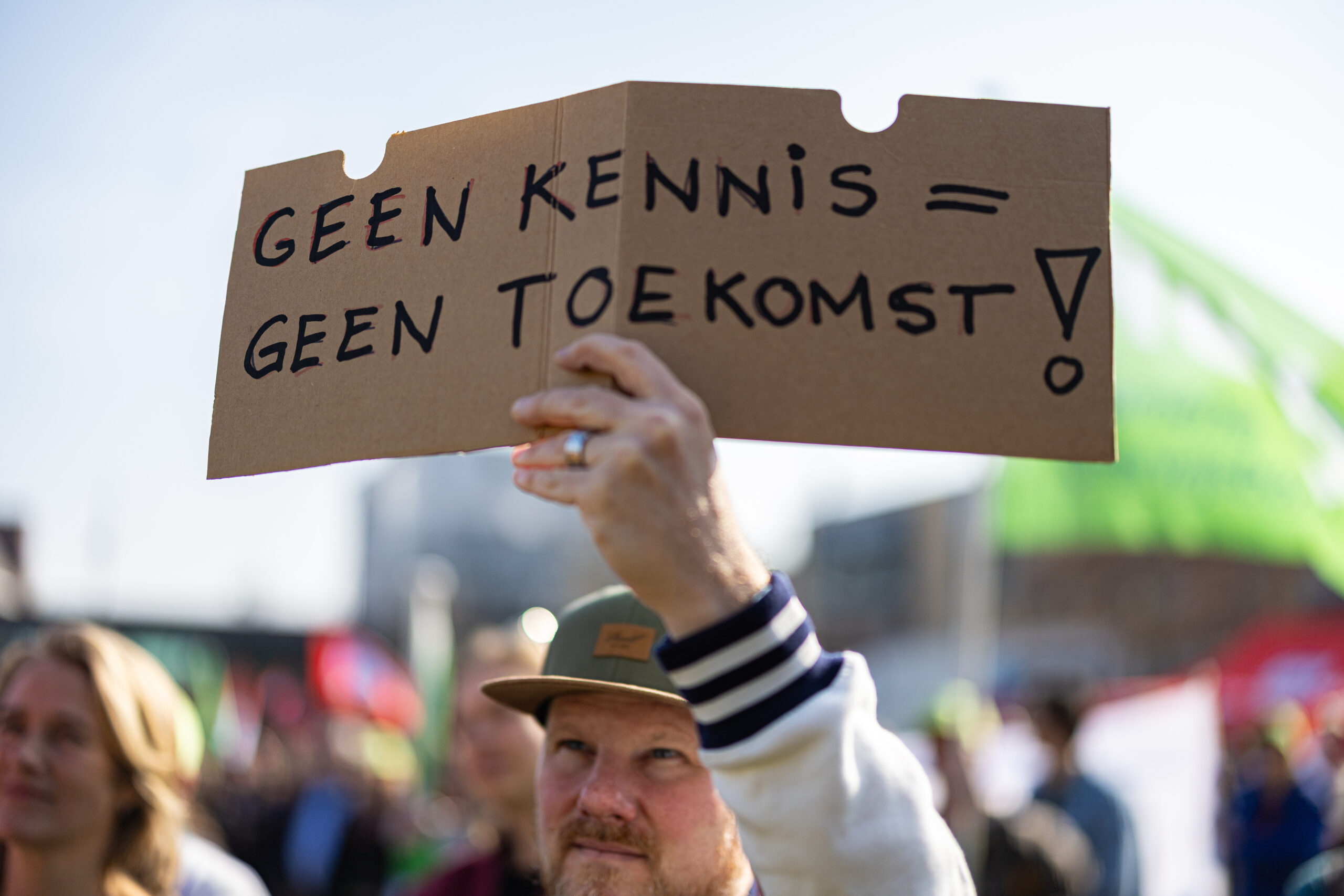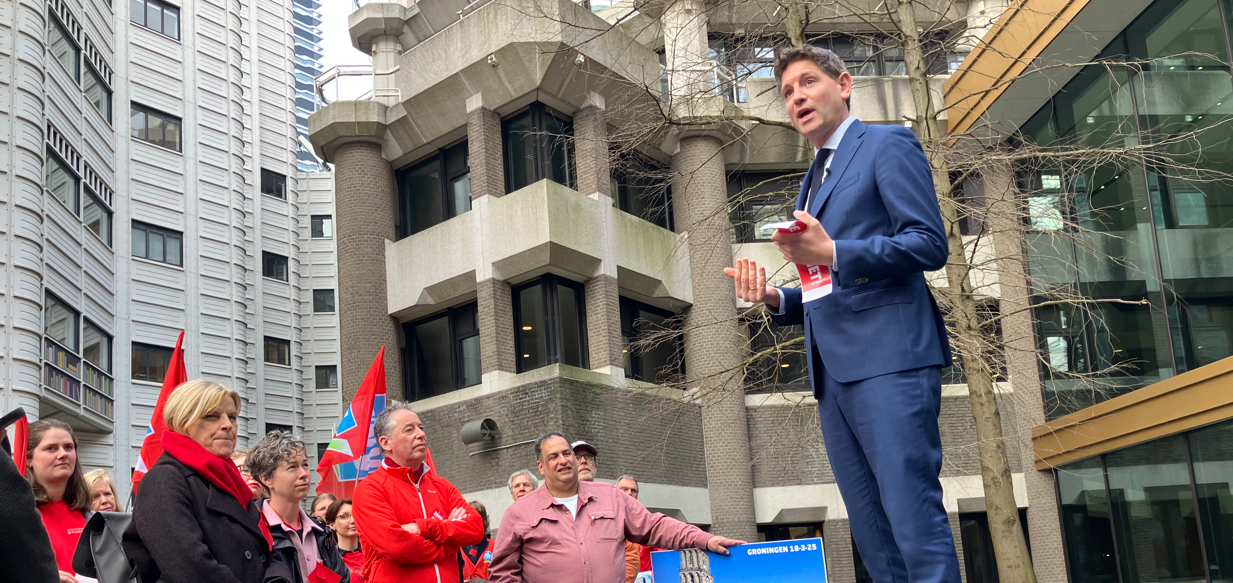The government wants big cuts in education and one way it plans to achieve that is by reintroducing the slow student fine. This measure means that students who take too long to graduate will have to pay 3000 euros extra in tuition fees, saving the government 282 million euros a year from 2026. But at what cost?
Have you already read this story in Resource magazine? You can find the read-through pieces at the bottom of this story in the gray boxes.
The idea of the slow student fine is that students who are more than 12 months late in graduating will have to pay 3000 euros extra in tuition fees. Universities will probably also get less funding from the government to cover these students, says Student Service Centre head Ingrid Hijman. ‘As a university, we need to think about how to cope with this. A lot depends on the final details. For example, will exceptions be made for students who spend a year on a committee, are chronically ill or are informal caregivers? We don’t yet know.’
Despite this lack of clarity, the slow student fine will have consequences beyond the extra pressure on students to graduate faster. It all starts with the choice of what to study, explains Daniëlle Vogels (degree choice guidance officer at WUR). ‘Many young people are afraid of making the wrong choice because if you switch degree programme, you have a delay. You only get the basic grant for three years, so that immediately means you have to take out a loan. That you pay interest on too. Having a slow student fine on top of that will just increase the pressure to get through university as quickly as possible.’
Welfare
This pressure is not good for students’ welfare, an area where big investments have been made in recent years, says Hijman. ‘It’s frustrating to see how this government seems intent on undoing all this effort. Stress is a key cause of mental problems in the current generation and the slow student fine will only increase that. You have study stress and financial stress. Students already often have part-time jobs to make ends meet, on top of the 40 hours a week they spend on their degree studies. If you’re afraid your part-time job will stop you graduating on time and land you with a slow student fine, you can take out a loan instead, but nowadays you pay interest on your student debt and it gets taken into account if you decide later that you want to buy a house. I can imagine this is stressful.’
Students will be far less eager to spend a year on a society board
Hijman also expects the fine will have affect students who want to develop through extra-curricular activities. ‘It got more difficult anyway after the pandemic to find students for the Student Council, society boards and committees or to organize the AID. At WUR, we think it’s important for students to grow in other ways besides through their study. We encourage that through the Student Financial Support scheme (FOS).’ This scheme compensates students financially if they get behind in their studies due to circumstances beyond their control, or if they join the Student Council, a society board or Thymos sports foundation. ‘We ideally want to assure students as soon as possible that they can continue doing these things without risking a fine. But as long as the details of the plans remain unclear, we can’t guarantee students won’t be affected.’
Societies
Which is why the cabinet’s plans are also causing concerns among student societies, says Christel Konings, chair of the Wageningen Federation of Student Societies. ‘Students will be far less eager to spend a year on a society board. They’re already under a lot of pressure to graduate fast. Everything that keeps a society going — the time and effort invested by its members — will suffer.’ The measure may also affect societies’ membership numbers. ‘Tuition fees have risen a lot, as has the interest on student loans. At the same time, the basic grant is being cut by about 150 euros and now a slow student fine is being introduced. The time you spend in your student society is time you aren’t spending on your degree. So we may find fewer students wanting to join a society. Or they may decide not to move out because living with your parents while studying is cheaper and less distracting. In the most extreme cases, students may choose to skip all aspects of university life except the degree studies. I’m not saying everyone will do that, but it may go that way for some.’
Students are amazed and astounded by the government’s plans, says Konings. ‘After years spent investing in measures to reduce stress, now you introduce a fine that promotes a culture in which errors are punished mercilessly. That makes me wonder exactly what is expected from students. I realize that cuts are needed, but how about finding a middle way?’
How many slow students?
The details of the slow student fine are not yet known. However, to get an idea of how many WUR students would have to pay the fine, we asked Geertje Braat of Education & Student Affairs how many students are already more than 12 months behind in their Bachelor’s or Master’s programme.
‘It’s difficult to give a meaningful answer,’ says Braat. ‘At the moment, all we have is an announcement in the framework coalition agreement. The details of the slow student fine are still not clear. For example, are you allowed a year’s extension each for both your Bachelor’s and your Master’s, or is it a maximum extension of one year for your entire time as a student? Will exceptions be made for someone spending a year on a society board, or someone who is sick for a long period? Will it only apply to new students or also students who are already at university?’
‘If I look at the recent historical data, about 82 per cent of Bachelor’s students get their Bachelor’s degree within four years — the three norm years for the Bachelor’s programme plus one extra year. So 18 per cent take longer and could potentially get a slow student fine. 94 per cent finish their degree within five years and 99 per cent within six years.’
‘Among Master’s students, we see Dutch students often take longer than international students. 89 per cent of international students from the European Economic Area (EEA) complete their Master’s within three years, and 97 per cent of students from outside the EEA. In contrast, 77 per cent of Dutch Master’s students graduate within three years — the two norm years for the degree plus one extra year. If you look at how many have graduated within four years, the figure is 93 per cent.’
‘Given all this, 18 per cent of the Bachelor’s students and 23 per cent of the Dutch Master’s students would qualify for a slow student fine, assuming you’re allowed an extension of up to one year for both the Bachelor’s and the Master’s. If the limit is one year extra for the two degrees combined, the group is bigger.’
‘As said, you see Dutch students tend to take longer to complete their degree than international students. However, they often get more credits and may also be more involved in extracurricular activities, such as spending a year on a society board. Once the slow student fine is actually introduced, students will undoubtedly take it into account and change their behaviour. That is why I would like to stress historical data give no guarantee for the future.’
Expensive degrees
WUR offers four two-year Master’s programmes that only take one year according to the legal norm: International Development Studies; Development & Rural Innovation; Management, Economics & Consumer Studies; and Communication, Health & Life Sciences. Will students doing these degrees get a slow student fine the moment they have any delay?
‘At present, WUR covers the funding some of these students miss out on because the degree takes longer than the government assumes is necessary,’ explains Hijman. ‘These are mainly students who come to us from a university of applied sciences, because they end up taking longer anyway. But what if all students who have any delay at all end up qualifying as ‘slow students’ who therefore have to pay an additional 3000 euros in tuition fees? Should WUR compensate them for that? We would have to really because it’s the university’s decision to make it a two-year degree, not a choice made by the student. But is that even possible financially?’
According to Hijman, a similar issue arose with these degree programmes 14 years ago. ‘Back then, Arthur Mol — before he became rector — led an investigation into whether we should continue to offer these programmes, or alternatively make them shorter or perhaps abolish them altogether. The conclusion was that it was better, both in terms of content and financially, to continue with the Master’s programmes in the same form.’

 A demonstration against the slow student fine in Utrecht last June. Photo ANP/Bas van Setten
A demonstration against the slow student fine in Utrecht last June. Photo ANP/Bas van Setten 

